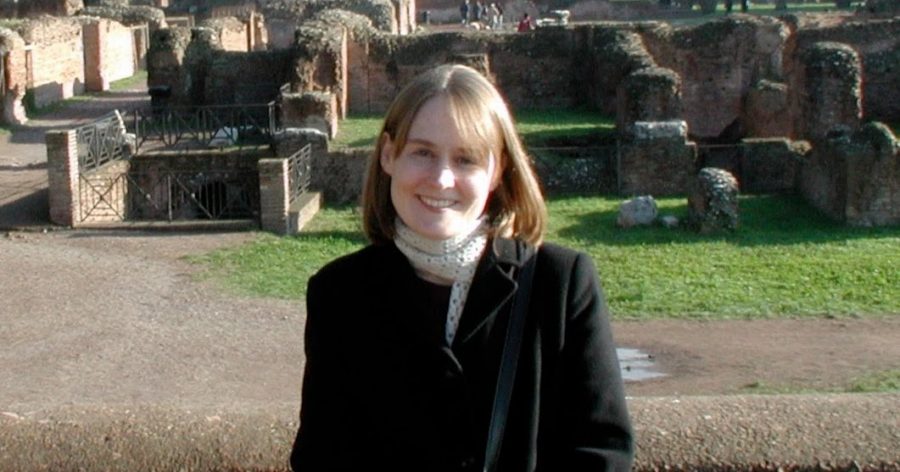NYU Philosopher Starts Speaker Series
October 4, 2018
Last week, Union welcomed New York University philosopher Sharon Street for a lecture titled “Finite Valuers and the Problem of Vulnerability to Unmitigated Loss” on her ongoing book project.
The project topic surrounds the source of unhappiness or loss when people fail to have what they value in life and how to rectify such “loss.”
As a Professor of Philosophy, Street has been teaching at NYU since 2012. She received her Ph.D. from Harvard in 2013 with the dissertation “Evolution and the Nature of Reasons.” Street specializes in ethics and metaethics with a focus on developing “an account of reasons which fits with a scientific naturalistic account of the world.” She has published in scholarly journals and edited volumes, including Philosophical Studies and Oxford Studies in Metaethics.
Coming to Union, Street wished to not only share the reasonings she has come about but also to receive feedback and counter-arguments from the philosophy faculty members, students and campus members.
Starting the lecture at Everest Lounge, Street defined “the Holy Grail” of philosophical secular analytic metaethics: “[It’s] a clear, intuitively satisfying philosophical account of the subject matter of ethics that both vindicates a strong form of ethical objectivity and does so without metaphysical or epistemological mystery.” Street expresses skepticism on the existence of such Holy Grail and searches for the Non-Holy-Grail in generic metaethical constructivist strategy. Street credits this reasoning to Christine Korsgaard — a famous American philosopher — and draws references to Buddism, which, as Street puts, “centers around a universal problem of ‘sufferings’.”
For her upcoming book, Street rephrases the second step as “arguing that no matter what the particular substantive content of a given agent’s set of values, she faces what I’ll call the problem of vulnerability to unmitigated loss.” This step is what the latter part of her lecture pinpoints.
Street raises the vulnerability of human beings, saying, “We are so vulnerable that a clear awareness of this vulnerability can have a corrosive effect on our ability to go forward.” Our attention to reality and reality’s inability to meet our expectations could render us — the “valuer” of life — dysfunctional.
Street describes the gap between expectations of our world — how it should be to be “good and desirable,” and how it really turns out “a loss for the valuer.” The NYU professor clarifies that the use of the term “loss” here is unconventional.
The loss here does not necessarily have to have happened in the past and “does not require that one ever even possessed something in the first place in order to suffer a loss.”
As Street continues, there are valuers — people — who are less vulnerable than others, but hardly any invulnerable valuers. To be an invulnerable valuer, one has to not value the basic necessities like eating and sleep; if one did, one would suffer the vulnerability of daily survival.
They have “no reasons for action” and when they do act, they are “making mistakes on their own terms.” To mitigate the degree of vulnerability, “you have to value the things that are either immutable or already in the past,” Street points out.
On the other end of the spectrum, there are people who are more vulnerable due to experiences of what Street coins as “extremely serious loss.” One of the examples Street draws is the loss of a child experienced by the mother. In the context of this example, Street argues against the stance of Buddhism, in which such immense pain is categorized as suffering, and one has to take in the
suffering as it is in order to remove it. Street believes this stance may be problematic because the pain of losing a child is not the problem. To the mother herself, the problem is the child’s death. Nevertheless, Street also points out that “suffering” is a somewhat misleading translation of the original Buddhist term, and that Buddhist meditation focuses on acceptance, not apathy.
She laters advocates for Buddhism’s stance of pure awareness.
As for the less extreme ends of vulnerability or suffering, Street categorizes us “valuers” with a two-line diagram, each line a two-way arrow. According to Street, one can be “extremely mellow” — not giving a care to the world and the problems in her life if she perceives the existence of any problem at all — or “extremely invested.” At the same time, one can be “extremely lowaiming” or “extremely high-aiming.”
A combination of “mellow” and “low-aiming” would create less loss as the valuer values less and in lower intensity, while those who are “extremely invested” as well as “extremely high-aiming” may experience more unmitigated loss.
Given that reasoning, Street still encourages the attendees to take the more invested and aiming way of life to enjoy life and love while knowing the possibility of loss.
The vulnerability in life can be addressed through alternative strategies like “denying the facts,” “ignoring the facts,” “hardening oneself” or “numbing out.” However, all these alternative methods are lacking “on terms that are arguably involved in any agential perspective.” Ultimately, Street argues that vulnerability can be best addressed through a combination of the Korsgaard method of adopting an ethical perspective and obtaining an accurate seeing of reality. According to Street, these combinations can be found in eastern meditative traditions like Advaita Vedanta and Buddhism.
Reaching the end of her reasonings, Street accepted questions from students and faculty members.







